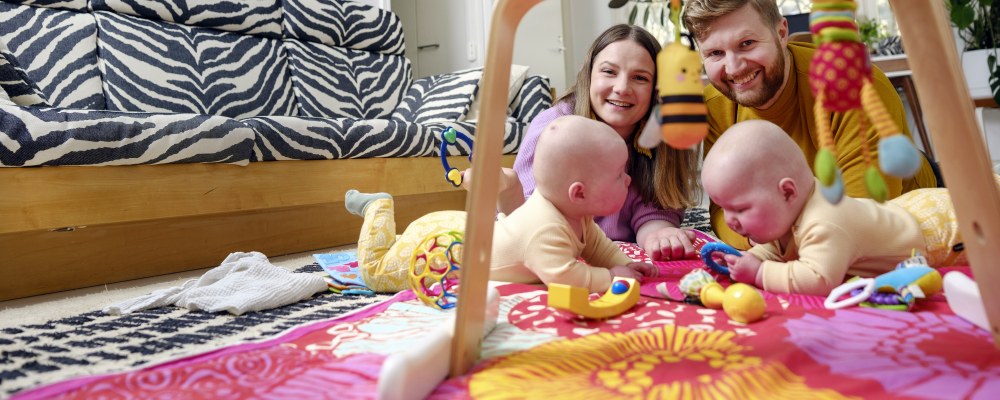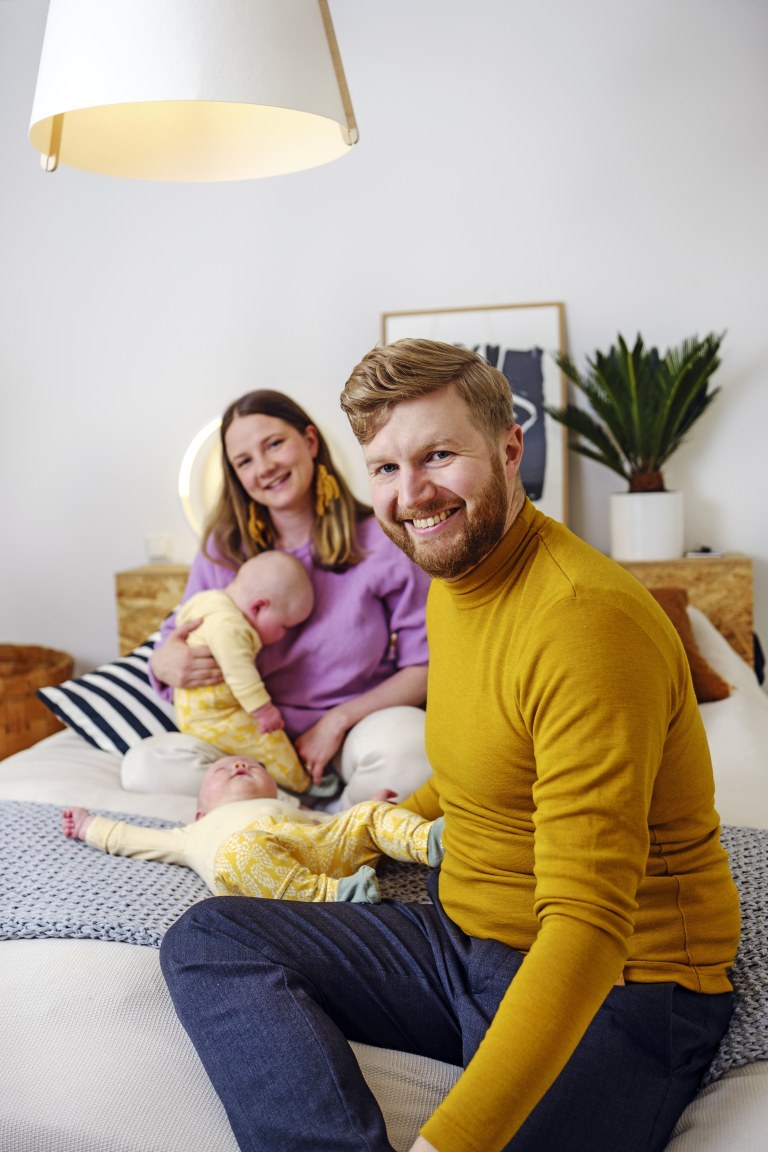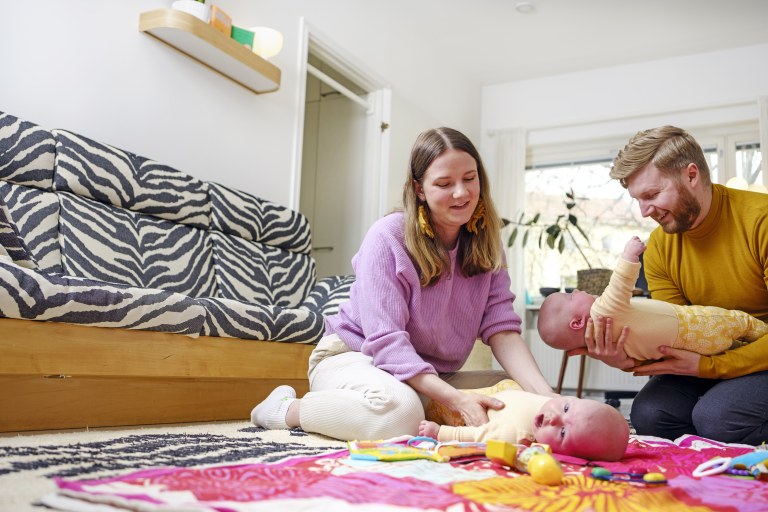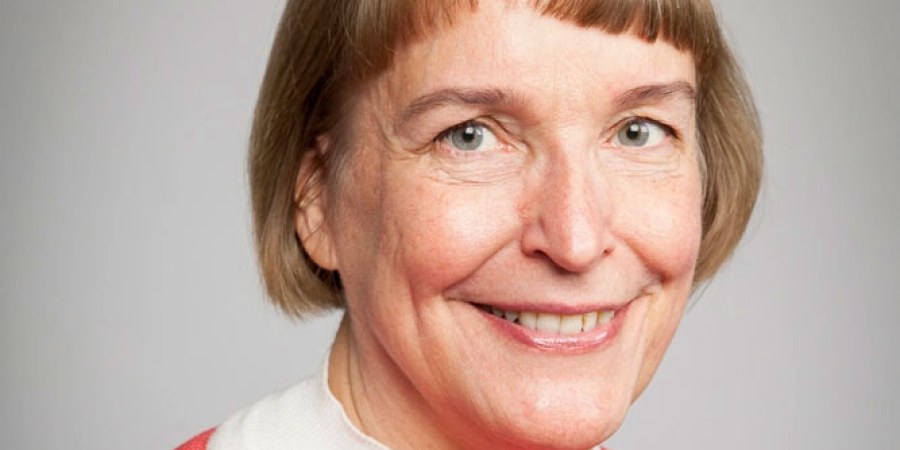
I set up a remote connection to Käpylä in Helsinki, and the camera reveals Maria Kultanen and Lasse Heikkilä, in addition to two small humans. The whole family is here.
“This interview will keep the twins entertained,” explains Kultanen.
The twins Aili and Aliisa were born in October 2023. Their mother, Maria Kultanen, is currently at home with them and will go back to work at the end of August. It will then be Lasse Heikkilä's turn to be a stay-at-home dad.
When the children were born, both parents took 4.5 months of family leave simultaneously. That is the maximum time that the parents of twins can spend on leave at the same time. From the very beginning, the plan was to divide family leave equally.
“The twins keep us busy. We both want to have a chance to get to know them and, on the other hand, make sure that neither one of our careers will suffer too much,” says Kultanen.
Kultanen holds a Master of Science (Tech.) in Bioengineering and works as a Business Development Manager at the pharmaceutical company Novo Nordisk. Heikkilä holds a Master of Science in Economics and Business Administration and works at the software company Solita as a Project Manager in data services.
“It is important for workplaces to avoid being too dependent on individual people. Nobody should be irreplaceable. The others know what I do, so when I go on family leave, nobody has to worry about how the team will cope without me,” says Heikkilä.
Starting a family was not a long-term plan for Kultanen and Heikkilä, but the idea gradually matured. Both were in a good place in terms of their career and income level. Kultanen finds it important that the employer can guarantee that having a baby will not stand in the way of career or salary progression.
“Quite a few women are, like myself, trying to identify the moment when their career is stable enough for them to be away from work for a certain period of time. When you start trying to get pregnant, it’s not like ordering fast food, which you can fit into your schedule in between tasks. Getting pregnant is not easy for everyone, and sometimes you may have more than one child at a time – you can’t control it,” she says.
Shared family leave signifies equality for Kultanen and Heikkilä. Neither parent will become the primary caretaker or the one who is just along for the ride. They both know what goes in the diaper bag and what needs to be done before going out as a family.
“It would be incredibly tiring for one parent to always have to tell the other what to do,” says Kultanen.
“Now that I’m back at work, I need to stay sharp to keep up with the development,” Heikkilä adds.
“There’s something new every week! Now I have to hide the bottle, because we’re introducing the babies to solids,” says Kultanen.
TEK members’ employers offer sufficient support
In terms of parents with children under the age of 1, 24 per cent feel that family leaves have a negative impact on career development. The percentage of all respondents who feel this way is 12 per cent. This was revealed by TEK's labour market survey 2023, in which roughly 9,000 TEK members answered the questions about family leave.
Maria Kultanen admits to having some concerns about going on family leave. However, her employer Novo Nordisk never gave any reason to believe that her career might hit a dead end due to the family news.
“Our team is very family-friendly, and many of us have kids. Me going on family leave was never an issue. My colleagues actually seemed to be more surprised by the fact that I will be going back to work “already” after one year,” says Kultanen.
Many advised her to enjoy her time at home and not rush back to work. Kultanen feels that her shorter family leave might give the impression that she is in a rush to build her career.
“That’s not what it is. Fathers also have the right to spend time with their kids.”
The article continues after the image.

Lasse Heikkilä says that everyone at work congratulated him when they heard the news.
“When I told them that we are having twins, one of them jokingly said that I always seem to avoid the easy road!”
Substitutes were not hired to replace either of the two at work, but their duties were distributed to other employees.
In TEK’s labour market survey, 80 per cent of the respondents reported that their employer offers sufficient support for reconciling work and family life. The percentage of parents with children under the age of 1 who felt this way was an impressive 94 per cent.
Kultanen’s employer provides the option of working shorter weeks, and her workplace has a culture where family comes first and work comes second. For example, if you need to pick up your child from day care at a certain time, you can do so.
Heikkilä knows many colleagues who work four days a week. Some of them have families.
“I have decided that, right now, I do not want a career where I work ten-hour days at an intense pace. Maybe some day, but now I do not want to push myself to the point of exhaustion,” he says.
Now that Heikkilä is back at work, he also does some work remotely. During his breaks, he can help out with the kids and after work he takes main responsibility for them. But sometimes it is a good idea to go to the office.
“Meetings create some noise when I’m working remotely.”
“If we had a bigger home, remote work would work. We have three rooms and a kitchen. Sometimes I have banished Lasse into the sauna during his meetings,” says Kultanen.
She says that although spending time with the kids is great, it can sometimes be lonely. The employer’s Easter greetings and an invitation to a summer party meant a lot.
Narrow roles for fathers and mothers
Lasse Heikkilä thought that, after having children, he would immediately feel a profound connection with other fathers. However, during family leave, he noticed how much the image of fatherhood has started to bother him.
“All the times when fathers throw up their hands and give up! Taking care of a child is not rocket science. I notice things in myself that are associated in popular culture with the mother image and the maternal instinct. Like the mother who just keeps going no matter what.”
Kultanen recognizes the phenomenon. She has noticed that having children makes some people endorse more conservative values than they did before.
“Women in general seem to find it difficult to share responsibility with their spouse, let them make their own mistakes. And men argue, as if it were a universal truth, that the child just happens to settle better in the mother’s arms. That the mother can get up at night, because the mother has all these hormones.”
Lasse Heikkilä used to need nine hours of sleep at night, but after having children, he realized that he can manage with less. Sometimes he takes care of the last night feeding, gets up at night to console the twins or wakes up early in the morning with them.
“I was surprised at how well I can work even in the middle of busy family life,” he says.
The article continues after the image.

Maria Kultanen was surprised at how little changed with having kids.
“The same things as before still bring me joy and a sense of achievement. And I have not fallen in love with all babies, just my own children. Mothers are not superhumans, anyone can go the extra mile.”
Having children has affected Kultanen's priorities. If something at work annoys her, she feels calmer knowing that her family, her gang, is waiting for her at home.
“Families with small children are often portrayed in a negative light. And sure, it’s hard! I’m not a baby person, but here I am, raising our family, friends and caretakers for Lasse and I for the next 60 years, if all goes well. That is an encouraging thought.”

Equal paid family leave is a great achievement
The number of days of family leave is defined by law, but whether the leave is paid or not is defined in the collective agreements negotiated by trade unions.
“Allowing fathers to take more time off and taking diverse family types better into account is very important for equality,” says Tuula Aaltola, collective agreement expert in the private sector from TEK.